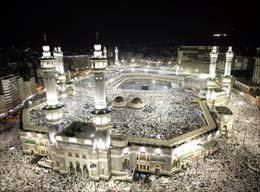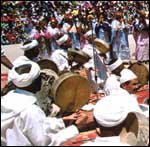UPDATE: STAMPEDE DEATHS: 345 killed
 The building that collapsed Thursday morning in Mecca is not part of places of residence for Moroccan pilgrims, said the Ministry of Habous (endowments) and Islamic affairs in a press release.
The building that collapsed Thursday morning in Mecca is not part of places of residence for Moroccan pilgrims, said the Ministry of Habous (endowments) and Islamic affairs in a press release."The Moroccan mission in Mecca said the building that collapsed is not part of places of residence for Moroccan pilgrims," said the Ministry, noting that the mission is following closely the incident.
At least 15 pilgrims were killed Thursday and 39 injured when the five-story Al Ghaza Hotel, which is about 60 yards from the Grand Mosque, collapsed around them just after they returned from midday prayers. A statement from the Saudi Interior Ministry, quoting Ali al-Tuwejli, head of Mecca's civil defense team, said the death toll could reach 20 and the number of wounded could number more than 80.
The tragedy in Islam's holiest city came as millions of Muslims converged for the annual hajj pilgrimage, which begins Sunday.
The gathering has been hit with tragedies frequently in recent years.
 The worst hajj-related tragedy occurred in 1990 when 1,426 pilgrims were killed in a stampede in an overcrowded pedestrian tunnel leading to holy sites in Mecca.
The worst hajj-related tragedy occurred in 1990 when 1,426 pilgrims were killed in a stampede in an overcrowded pedestrian tunnel leading to holy sites in Mecca.In 2004, on the final day of the ceremonies, 251 people were trampled to death when the crowd panicked during the ritual stoning of the devil. Three years earlier, 35 hajj pilgrims were killed in stampede the same ceremony.
In 1998, about 180 pilgrims were trampled to death when panic erupted after several of them fell off an overpass during the ritual. Four years earlier, in 1994, some 270 pilgrims were killed in a stampede during the stoning ritual.
During an anti-U.S. demonstration staged by Iranians in 1987, some 402 people, mostly pilgrims from Iran, were killed and 649 were wounded in the crash of a Pakistani jetliner carrying hajj pilgrims from Jiddah to Riyadh, the Saudi capital.
 Morocco's Health Minister, Mohamed Biadillah, speaking during question time in the House of Advisors, announced that Morocco has 114 dialysis centers fitted with 1,351 machines.
Morocco's Health Minister, Mohamed Biadillah, speaking during question time in the House of Advisors, announced that Morocco has 114 dialysis centers fitted with 1,351 machines.The minister went on to point out that Morocco has entered into several agreements to rent or purchase over 250 machines for an annual cost of MAD 42Mn (USD 4.6Mn) during the next five years.
He went on to say that some 131 specialized physicians and a thousand nurses work in this field, stressing the need for setting up of a strategy of prevention, caring for patients suffering from renal failure, and kidney transplant.
The southern town of Ouarzazate is to host on May 12 through 14 an International Conference on the "Cultural Heritage and the Arts of the Sahara".
 The conference is held at the initiative of the Casablanca-based "Oued El Hajjaj pour la culture et le développement de Skoura-Ouarzazate » association and in coordination of the Hassan II-Mohamadia University.
The conference is held at the initiative of the Casablanca-based "Oued El Hajjaj pour la culture et le développement de Skoura-Ouarzazate » association and in coordination of the Hassan II-Mohamadia University.The gathering schedules debates and presentation to be attended and delivered by various professors and intellectuals on the cultural, art and linguistic heritage of the Sahara and on the paintings, music and songs of the region.

Over 100 American congressmen highlighted the need to grant the populations of Sahrawi provinces (southern Morocco) autonomy in total respect of Morocco's sovereignty and territorial integrity.
In a letter they addressed Wednesday to Secretary of State, Condoleezza Rice, the congressmen deemed that the "United Nations needs a larger support from the United States and our allies" to reach a "political solution" to the Sahara dispute that opposes Morocco to the Polisario Front. This Algeria-backed separatist group has been laying claim to Morocco's sahrawi provinces (south) since 1976 after Morocco recovered them from the Spanish occupation.
Exhorting the US administration to provide the necessary help to the UN, the 104 congressmen said a solution that will result in winners and losers would not be a success.
This question that lasted for too long threatens the stability of the region and jeopardizes Morocco’s security and progress, noted the letter, recalling the “growing tensions” regarding the Sahara issue, Polisario threats to wage war on Morocco and the attacks targeting Mauritania.
The document warned that the current situation may lead to extremist and terrorist acts likely to undermine the stability of the whole region.
The American law-makers recalled the attack last June that targeted a Mauritanian military post, expressing concern over Polisario’s continuous war threats against Morocco.
The letter was signed by representatives of the republican and democrat parties.
 The United Nations Development Fund for Women (UNIFEM) has expressed satisfaction over the attribution of a national budget for gender equity priorities in Morocco by the Ministry of Finance and Privatisation. The attribution of the budget “indicates the Moroccan government's commitment to gender responsive expenditures that ensure the achievement of specific targets and goals within sectors such as girls' school enrolment or illiteracy eradication,” the UNIFEM said in a release.
The United Nations Development Fund for Women (UNIFEM) has expressed satisfaction over the attribution of a national budget for gender equity priorities in Morocco by the Ministry of Finance and Privatisation. The attribution of the budget “indicates the Moroccan government's commitment to gender responsive expenditures that ensure the achievement of specific targets and goals within sectors such as girls' school enrolment or illiteracy eradication,” the UNIFEM said in a release.The measure, taken for the first time, is the result of close collaboration between the UNIFEM and the Ministry over the past four years.
Thanks to these combined efforts, the Ministry issued a gender budget statement, also known as the gender budget report, along with the 2006 Finance Bill.
“The gender report, as part of the Economic and Financial Report which accompanies the 2006 Finance Bill, addresses sustainable human development concerns where the status of women and their human rights are central and strategic for the achievement of the Millennium Development Goals,” said Mohammed Chafiki, Director of Studies of Financial Forecast at the Moroccan Ministry of Finance and Privatisation.
Tags: Morocco, Fès, Maghreb, news

No comments:
Post a Comment